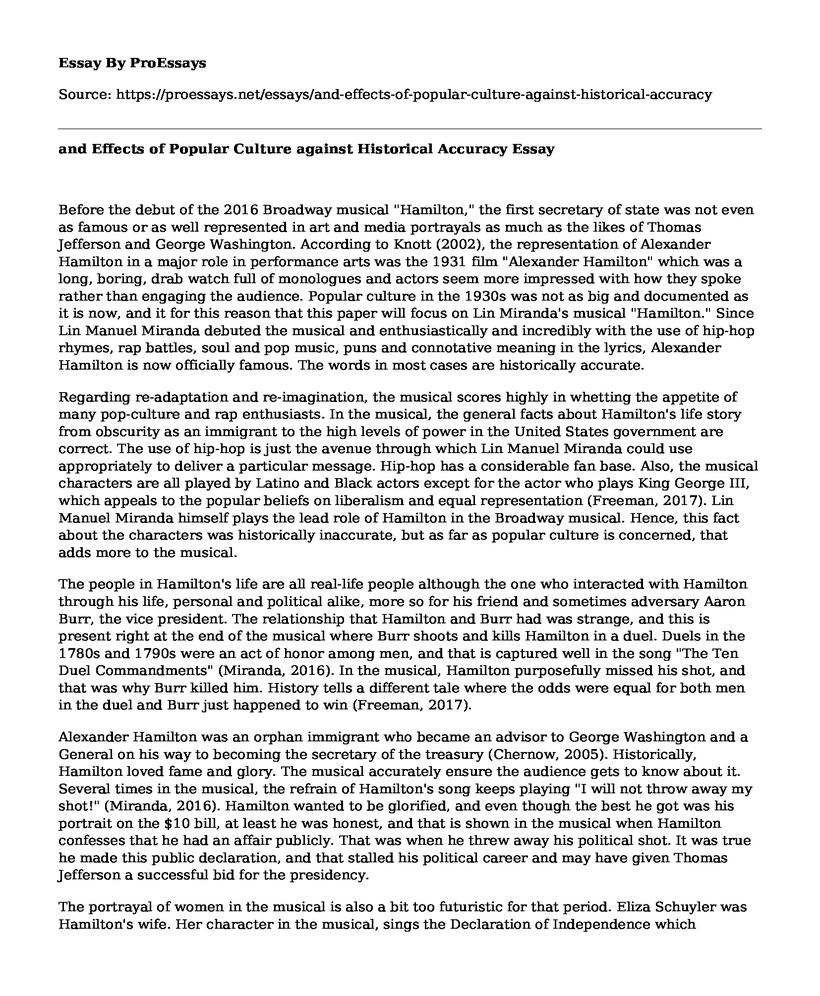Before the debut of the 2016 Broadway musical "Hamilton," the first secretary of state was not even as famous or as well represented in art and media portrayals as much as the likes of Thomas Jefferson and George Washington. According to Knott (2002), the representation of Alexander Hamilton in a major role in performance arts was the 1931 film "Alexander Hamilton" which was a long, boring, drab watch full of monologues and actors seem more impressed with how they spoke rather than engaging the audience. Popular culture in the 1930s was not as big and documented as it is now, and it for this reason that this paper will focus on Lin Miranda's musical "Hamilton." Since Lin Manuel Miranda debuted the musical and enthusiastically and incredibly with the use of hip-hop rhymes, rap battles, soul and pop music, puns and connotative meaning in the lyrics, Alexander Hamilton is now officially famous. The words in most cases are historically accurate.
Regarding re-adaptation and re-imagination, the musical scores highly in whetting the appetite of many pop-culture and rap enthusiasts. In the musical, the general facts about Hamilton's life story from obscurity as an immigrant to the high levels of power in the United States government are correct. The use of hip-hop is just the avenue through which Lin Manuel Miranda could use appropriately to deliver a particular message. Hip-hop has a considerable fan base. Also, the musical characters are all played by Latino and Black actors except for the actor who plays King George III, which appeals to the popular beliefs on liberalism and equal representation (Freeman, 2017). Lin Manuel Miranda himself plays the lead role of Hamilton in the Broadway musical. Hence, this fact about the characters was historically inaccurate, but as far as popular culture is concerned, that adds more to the musical.
The people in Hamilton's life are all real-life people although the one who interacted with Hamilton through his life, personal and political alike, more so for his friend and sometimes adversary Aaron Burr, the vice president. The relationship that Hamilton and Burr had was strange, and this is present right at the end of the musical where Burr shoots and kills Hamilton in a duel. Duels in the 1780s and 1790s were an act of honor among men, and that is captured well in the song "The Ten Duel Commandments" (Miranda, 2016). In the musical, Hamilton purposefully missed his shot, and that was why Burr killed him. History tells a different tale where the odds were equal for both men in the duel and Burr just happened to win (Freeman, 2017).
Alexander Hamilton was an orphan immigrant who became an advisor to George Washington and a General on his way to becoming the secretary of the treasury (Chernow, 2005). Historically, Hamilton loved fame and glory. The musical accurately ensure the audience gets to know about it. Several times in the musical, the refrain of Hamilton's song keeps playing "I will not throw away my shot!" (Miranda, 2016). Hamilton wanted to be glorified, and even though the best he got was his portrait on the $10 bill, at least he was honest, and that is shown in the musical when Hamilton confesses that he had an affair publicly. That was when he threw away his political shot. It was true he made this public declaration, and that stalled his political career and may have given Thomas Jefferson a successful bid for the presidency.
The portrayal of women in the musical is also a bit too futuristic for that period. Eliza Schuyler was Hamilton's wife. Her character in the musical, sings the Declaration of Independence which preserves only one original line, "we hold these truths to be self-evident, that all men are created equal" The next lines in the song promote feminist-oriented agenda, "When I meet Thomas Jefferson, I'm 'a compel him to include women in the sequel" (Miranda, 2016). Angelica Schuyler, Hamilton's sister-in-law, sings this part. In conclusion, the musical appealed to the people as evidenced by its success. Some people are talking about the possibility of a movie, an exciting and engaging one, unlike the 1931 film. Lin Miranda had to make some modifications in the musical such as the use of diverse actors and giving women equal representation than history did to appeal to popular culture appetites. Hamilton, the musical has some historical accuracies and inaccuracies, but in the end, it is a great and entertaining show and the best rendition of Alexander Hamilton.
References
Arliss, G., Hamlin, M., Josephson, J., Howell, M. (Writers), & Adolfi, J. G. (Director). (1931). Alexander Hamilton [Motion Picture]. The United States. Retrieved September 7, 2018
Chernow, R. (2005). Alexander Hamilton. London, United Kingdom: Penguin Books.
Freeman, J. B. (2017). Will the Real Alexander Hamilton Please Stand Up? Journal of the Early Republic, 37(2), 255-262.
Knott, S. F. (2002). Alexander Hamilton and the persistence of myth (p. 189). Lawrence: University Press of Kansas.
Miranda, L. (2016). Hamilton: An American musical. In J. McCarter (Ed.), Hamilton: the revolution (pp. 23-26). New York: Grand Central Publishing
Cite this page
and Effects of Popular Culture against Historical Accuracy. (2022, Aug 03). Retrieved from https://proessays.net/essays/and-effects-of-popular-culture-against-historical-accuracy
If you are the original author of this essay and no longer wish to have it published on the ProEssays website, please click below to request its removal:
- Historical Account of Slavery, Violence and Oppression in Conde on I Tituba
- Hercules Essay Example
- Race and Social Problems Essay Example
- Essay Sample on Lion Felling a Bull, From a Marble Pediment
- The Jacobs' Family Values Essay Example
- Civil War in America Essay Example
- Essay Example on George Carlin: Exposing the 'Truths' Concealed by Euphemisms







